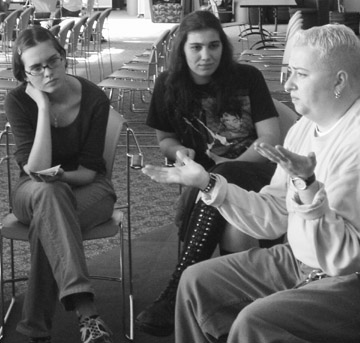Battering crosses gender lines, according to Gunner Scott, publicist and community outreach organizer for The Network/La Red, a domestic abuse center for lesbian, bisexual women and transgender relationships. Scott, 33 spoke to a group of concerned students in Ryan lounge last week to raise awareness about domestic abuse in non-traditional partnerships.
“It’s a problem most people aren’t aware of and even within [the gay, lesbian, bisexual, transgendered] community, people don’t want to speak about,” said Scott, speaking in firm, quiet tones, “One in four have been abused by their partner. That’s the same as in mainstream relationships.” Scott said that historically, the gay, lesbian, bisexual, transgendered community as a whole has always been reluctant to discuss domestic abuse, and the lesbian community especially. “We’ve been fighting an unwillingness to talk by GLBTs. There’s this stereotype of GLBTs having unhealthy relationships, unstable, promiscuous, and people don’t want to feed into that.”
Scott revealed that he had been the victim of domestic abuse in both a heterosexual and a homosexual relationship and said that some of the problems about the perception of abuse arise because gender equality, is a “new thing.”
“Before just recently, men saw women as property,” Scott explained. Legal protection against domestic abuse in heterosexual relationships is a relatively new thing, and newer still in non-mainstream relationships. The issues are complicated by the fact that homosexuals are not offered specific legal protection except in a few states and all of the domestic abuse statutes and legal recourses are intended for heterosexual partnerships.
For instance, getting a restraining order against one partner of a homosexual couple can be extremely difficult because marriage is not recognized and a judge may not rule that two women or two men living together are a couple. Also, if the police answer a domestic violence call, they may arrest the wrong person, or arrest both parties. Occasionally both an abuser and the abused even end up in the same cell together, which can present problems.
According to Scott, abuse within a homosexual or non-traditional relationship is also complicated by identity theft, easier because both partners are the same sex, and threats of outing. Scott says the The Network/La Red was set up to deal with just these problems, and the wider problem that domestic abuse within the GLBT community is not part of the network for heterosexual abusees. “Guess what? Shelters don’t take men.”
The Network/La Red operates much like a mainstream abuse shelter; it takes hotline calls, dispenses advice and in emergencies routes abusees to “safe houses” where anonymous volunteers put up victims for a few nights.
Scott gives the Boston Police and courts high marks for their awareness and sensitivity in same-sex disputes, but notes that this awareness drops off quickly outside urban areas.
Started in 1989, The Network/La Red has expanded from humble beginnings and now takes hundreds of calls per year and advocates for legal and political reform on GLBT issues.
The meeting was organized by the Queer Student Union and discussion ranged widely, from abuse to identity issues to bathroom politics. One student explained some of the personal complexities between gender and sex. The student, biologically male, identified herself as a non-transitioning transsexual, and said, “I associate better with women. I’m not a drag queen at all, but I feel female. If someone asked me [what my gender was] I say I was a woman.”
Another controversy Scott became embroiled in was at the famous Michigan Women’s Festival, a week-long bash that features female artists and musicians and admits women only. They don’t admit transsexuals, or women identifying and acting as men. Scott helped start Camp Trends in 1994, a camp of protesters that stayed outside the festival boundaries, and explained even since the festival instituted a “don’t ask, don’t tell” policy, they were trying to get acts to boycott the festival until its administration opened it’s doors to anybody who identified their gender as female. “We’re not real popular,” added Scott with a wry grin.
Scott admits that the political battles he and others are fighting in the GLBT community may be opaque to most of us, and says that is because this society wants easy answers, “It can’t be complex or layered or you’re throwing off the system.”





















































